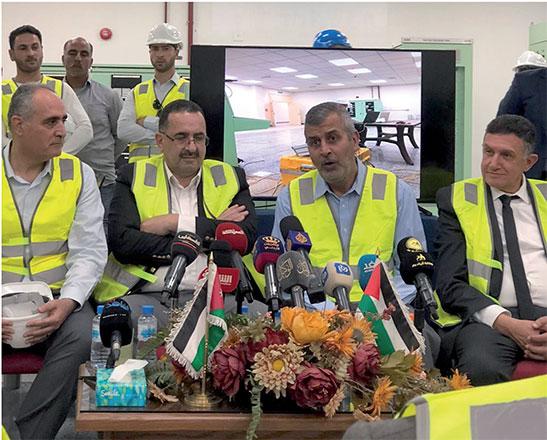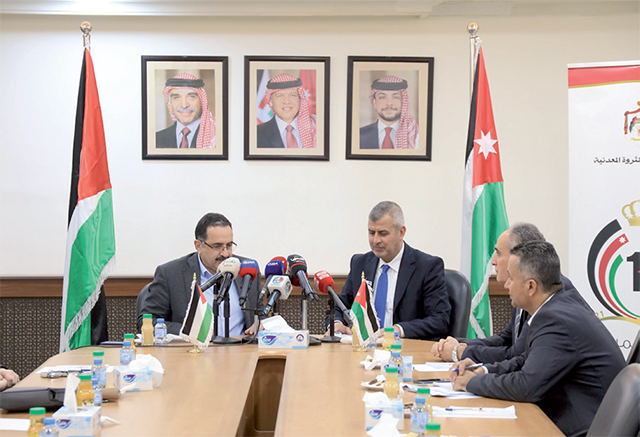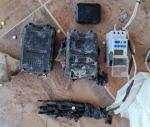You are here
Jordan to double amount of electricity exported to Palestine — Energy minister
By Batool Ghaith - May 31,2022 - Last updated at May 31,2022

Minister of Energy and Mineral Resources Saleh Al Kharabsheh speaks during a press conference at the Dead Sea area on Monday (Photo by Batool Ghaith)
AMMAN — The Al Rama plant project will raise the quantity of electricity exported from Jordan to Palestine from 40MW to 80MW as of July, according to the Ministry of Energy and Mineral Resources.
Minister of Energy and Mineral Resources Saleh Al Kharabsheh said that the project comes within the framework of “Jordan's keenness to meet the electricity needs for Palestine and to serve the interests of the two brotherly countries and people”.
The minister’s remarks came during a joint press conference at the Dead Sea area on Monday with President of the Palestinian Energy and Minerals Authority Dhafer Melhem, and General Director of the National Electricity Power Company Amjad Al Rawashdeh.
Kharabsheh stressed the importance of the Al Rama power station in raising the amount of energy exported to the Jerusalem Electricity Company from the Jordanian network from 40 megawatts to 80 megawatts, in the interest of the two countries and to increase cooperation in various fields, noting that the energy sector affects the rest of the sectors strategically and economically.
The minister noted that the project is the continuation of a joint project that began in 2008, where the Palestinian side purchases about 40 megawatts of electricity from the Jordanian network for the city of Jericho and the Jordan Valley.
According to a presentation at the conference, construction on the project is now 80 per cent complete and is expected to be completed by the end of June, while the testing and commissioning of the project will be completed by July 9 — when the project is also expected to begin operations.
The project’s agreement was signed in May 2021 with the aim to create a connection plant (Al Rama) from Sweimeh to generate twice the amount of electricity for Jericho, in the West Bank, and to expand later to Jerusalem, Ramallah and more, the conference heard.
The presentation added that the project will be implemented by the NEPCO staff, who have faced “many challenges”, such as severe weather conditions, the difficulty of accessing the area, as well as the limitation of resources.
The project employs about 50 civil engineers, foremen, technicians, drivers and a safety officer, the presentation said.
Melhem stressed the importance of the project as it will reduce dependence on Israel as an energy source.
“There are many reasons that prompted us to rely on the Arab side to diversify energy sources, specifically the Jordanian side, which will help achieve energy security and reduce the electrical deficit to meet the needs of the Palestinian citizens without interruption,” he said.
Melhem added that this agreement is not the last of its kind, as it will reduce Palestine’s reliance on Israel for energy from 100 per cent to 88 per cent.
“We have other resources and plans for the future and we are aiming to minimise our reliance on Israel to less than 20 per cent in the near future,” he added, which is done through reducing the quantities of electricity received from Israel through regional interconnection projects with neighbouring countries, such as Egypt and Jordan, as well as building Palestinian power plants and implementing renewable energy projects.
According to Melhem, this project comes in the context of the efforts made by the Energy Authority and the Palestinian government to overcome all legal and technical obstacles to ensure the continuation and development of electricity in Palestine.
“Economic disengagement from the occupation is our most important economic priority in the upcoming stage and this project will have a significant impact on changing the balance in the energy sector,” Melhem continued.
Rawashdeh highlighted that the project comes within a series of projects to increase the percentage of electricity exported to Palestine to cover Palestinians’ electricity needs.
He noted that discussions are underway to increase these quantities in the future, leading to “continuous cooperation” with the Palestinian side to raise Palestine’s supply capacity.
NEPCO is also working on training Palestinian technical personnel in Jordan through a special training programme to share the experience acquired in the field of establishing, operating and maintaining electrical systems, Rawashdeh said.
According to the Ministry of Energy, the project costs $4.1 million. The first phase of the project includes the construction of a 132/33 kW transformer station in the Jordanian-Palestinian border area (Al Rama) and it consists of a transfer station (6 cells of automatic breakers of 132 kW and a transformer of 132 / 33 kV with a capacity of 80 MVA and 3 cells of automatic breakers).
The second phase will supply Jerusalem with electricity, and also provide electricity to Ramallah and Al Bireh. In order to enhance electricity access to the outskirts of the city of Jerusalem and Bethlehem, it will include a 132/33 kV transformer with a capacity of 80MVA.
Related Articles
AMMAN — Minister of Energy and Mineral Resources Saleh Kharabsheh on Thursday stressed the importance of increasing the power capacity expor
AMMAN — National Electric Power Company (NEPCO) Director Amjad Rawashdeh, and Chairman of the Board of Directors of the Jerusalem Electricit
AMMAN — Jordan and Palestine on Sunday agreed to increase the amount of power the Kingdom exports to Palestine. Jordan currently has th


















